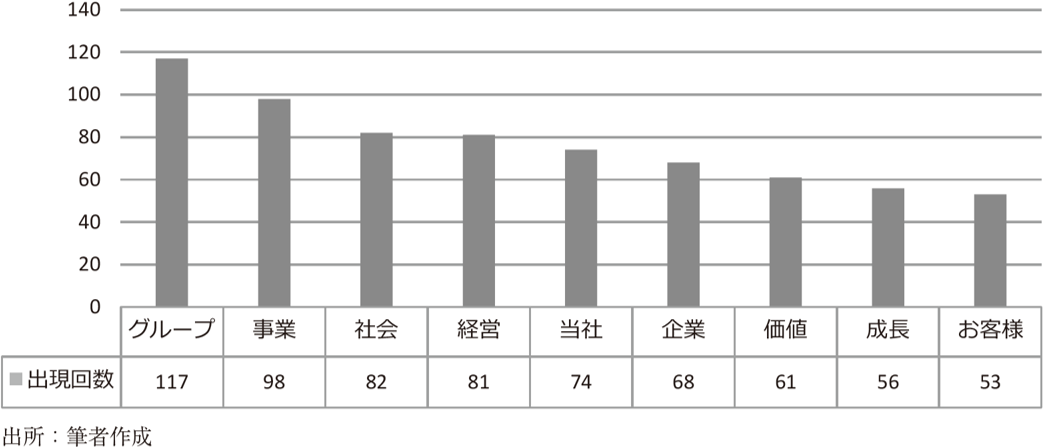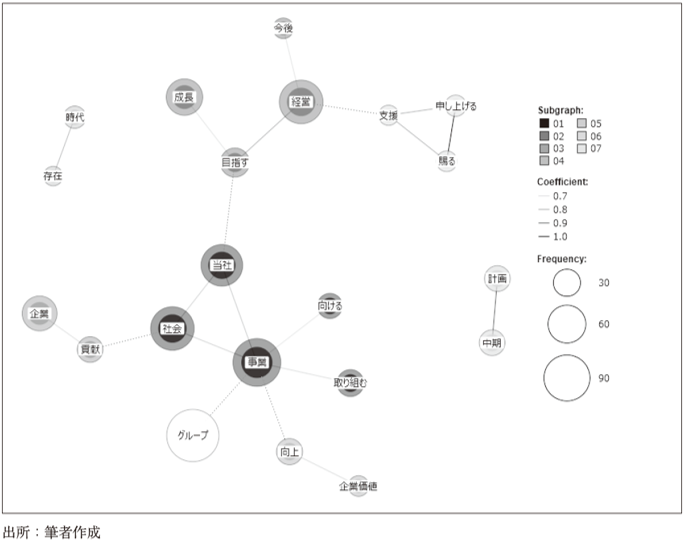
The Characteristics of Companies with Purpose-based Management — Focusing on Economic Performance and Messages from Senior Management —
March 29, 2024
C-2023-001-2WE
1. Introduciton
It is said that we live in the era of VUCA (Volatility, Uncertainty, Complexity, and Ambiguity). Today, companies are required to appropriately and accurately address not only the business environment but also social change. This situation has become the backdrop for the discussion of new approaches to corporate management, such as ‘dynamic capabilities’ and ‘ambidextrous management,’ within the discipline of business administration. The idea of ‘survival of the fittest,’ referring to the ability of creatures to survive by adapting to the external environment, was advanced by Herbert Spencer and others. Companies, too, face conditions where this ability to adapt is in high demand.
In this context, ‘purpose-based management’ has been attracting widespread attention in recent times. Purpose-based management is variously defined but generally refers to corporate management based on the company’s purpose for existing within society.
According to a database provided by Nikkei Inc., the expression ‘purpose-based management’ first appeared in Japanese in an article published on April 1, 2021. This was followed by seven articles using the expression in 2021, 23 in 2022, and 14 up to the end of July 2023. In this way, the concept of purpose-based management is carving out a new direction in corporate management. At the same time, however, debate on this concept is still in its infancy, and its legitimacy is under examination from a range of different approaches.
In this paper, I analyze companies that I categorize as ‘companies with purpose-based management,’ meaning companies that use the word ‘purpose’ in their corporate or management philosophies and affirm that this purpose is firmly embedded throughout the organization, up to senior management level. (I continue to use the expression ‘companies with purpose-based management’ in this sense throughout the paper.) More specifically, I define ‘companies with purpose-based management’ as companies that meet both of the following two criteria as of August 15, 2023.
The first criterion is a response of “d. Purpose” to question IV (1-1) in the tenth corporate CSR survey conducted by The Tokyo Foundation for Policy Research in FY2023 (hereinafter, “the Survey”): “Which of the following best describes the name of your company’s corporate philosophy, management philosophy, or similar standard?”
The second criterion is a response of “a. Reflected in decision-making, judgment, and action by senior management and corporate officers” to question IV (1-5) in the Survey: “Overall, to what extent has the corporate philosophy, management philosophy, or similar standard described in question (1-1) taken root in your company?”
There are 28 companies that meet both these criteria. Through an analysis of factors such as the messages disseminated by the senior management of the companies with purpose-based management and their economic performance, I hope to examine the legitimacy of purpose-based management. As of the time of writing, 169 companies in total have responded to the Survey, of which approximately 16.5% are companies with purpose-based management.
2. Trends in Purpose-based Management
As noted above, recent years have seen purpose-based management rapidly rise to prominence as a new corporate management approach. Behind this increased focus on purpose-based management lies the emergence of CSV (Creating Shared Value) and the criticism it has attracted.
CSV was first proposed by Michael Porter in 2011 as a new approach to corporate management, aimed at creating both economic and social value. Porter and others note that “Shared Value is not social responsibility, philanthropy, or sustainability, but a new way for companies to achieve economic success.”[1] From the perspective of value creation, CSV characterizes a company’s dual role as a profit-seeking organization and one that is active within its relationships with society. It has already had a substantial impact on the management of many companies.
While CSV has won significant support for its logic of engaging in the creation of social value as a means to achieve economic success, it has also attracted much criticism. I will not examine this criticism in detail here, but they include points such as the following. “CSV, when implemented in the context of CSR, is a keyword in achieving sustainable growth. However, once separated from CSR, CSV becomes nothing more than a profit-centered, self-serving growth model, and cannot gain social credibility.”[2] The criticism of CSV seems to focus on the fact that it still maintains profit-seeking or profit-making as the central principle governing corporate behavior.
This has led to the increased focus on purpose-based management, which identifies the company’s purpose, rather than earning profits, as the main principle of corporate behavior. In addition to the systematic merit of boosting companies’ organizational capacity through its effect in boosting employee satisfaction and engagement,[3] purpose-based management has the strategic merit of guiding companies to reconsider why growth is necessary and whether a business is really one that should be pursued.[4] This emphasis on merits other than profit-making as the main principle governing corporate behavior is a characteristic of purpose-based management.
It is only relatively recently that the term ‘purpose’ has become a focus of attention in the context of corporate management. Previously, various terms such as ‘company creed,’ ‘mission,’ and ‘vision’ were used in a similar sense to ‘purpose.’
A range of different responses were provided to question IV (1-1) on the Survey — “Which of the following best describes the name of your company’s corporate philosophy, management philosophy, or similar standard? (Multiple responses allowed)” — with none of the names clearly standing out as the most popular. Peter Drucker explains companies’ social legitimacy from the three perspectives of mission, vision, and value,[5] and in both the practical and academic context, mission has been the marginally more prominent and more widely researched term.
In this sense, research on purpose-based management is still in its infancy. At present, the debate over the legitimacy of purpose-based management is focused on five approaches: 1) social systems, 2) financial, 3) governance, 4) learning, and 5) branding.[6]
With these points in mind, in the limited space available here, I analyze purpose-based management from the perspective of the 2) financial and 3) governance approaches.
3. The Economic Performance of Companies with Purpose-based Management
I will begin with an analysis using 2) above, the financial approach. The relationship between corporate philosophy and economic performance is a key point of contention, as demonstrated by the Japanese best-seller status of Built to Last: Successful Habits of Visionary Companies by Jim Collins, who examines the significance of this relationship. A large amount of related research has already been undertaken on this topic. The published results of this research are divided between affirmative and negative, with no definite conclusion yet reached regarding whether corporate philosophy is actually linked to a company’s economic performance.[7] Technical issues related to analysis, such as differences in the qualitative data used in each research, are some of the factors cited to explain this ambiguity.[8]
These issues have prompted me to limit the scope of this paper to companies with purpose-based management and use a single metric, return on equity (ROE), to measure economic performance.
The Ministry of Economy, Trade and Industry’s so-called Ito Review (“Competitiveness and Incentives for Sustainable Growth: Building Favorable Relationships between Companies and Investors”), which published its final report in August 2014, used a specific quantitative target for ROE, stating that each company should commit to achieving, at minimum, an ROE of 8% or above.[9]
The most recent ROE of Japanese companies, based on the results for companies listed on the Tokyo Stock Exchange with fiscal years that ended on March 31, 2023, for that fiscal year (FY2022), averaged 9.07% across all industry sectors, 0.3 percentage points lower than the 9.37% recorded in the previous fiscal year.[10]
Under these conditions, what are the levels of ROE among companies with purpose-based management? Of the 28 companies with purpose-based management, ROE figures for the fiscal year ended on March 31, 2023 (FY2022) could be obtained for 26 companies as of August 15, 2023. Table 1 shows the results of calculating the mean ROE and other measures for these 26 companies.
Figure 1: Status of ROE in FY2022 for Companies with Purpose-based Management
| Mean | 8.2 |
| Median |
10.4 |
| Standard deviation | 8.99 |
| Minimum | -20.3 |
| Maximum | 23.8 |
Source: Compiled by the author
These statistics show that while companies with purpose-based management achieved a mean ROE of 8.2% in FY2022, exceeding the 8% level required by the Ito Review, this fell short of the mean 9.07% achieved by all of the companies listed on the Tokyo Stock Exchange. However, it should be noted that the median value is 10.4%, the lowest-ROE company has a large negative ROE, and not all the companies with purpose-based management considered are listed on the Tokyo Stock Exchange. It could therefore be inferred that the actual economic performance of companies with purpose-based management is roughly average or somewhat better than average.
While this clarifies the economic performance of companies with purpose-based management, it should be noted that the level of ROE and other measures of economic performance do not directly determine the legitimacy of performance-based management. Certainly, economic performance is an extremely important criterion for evaluating companies, which are profit-seeking entities. However, economic performance only indicates companies’ fulfillment of the economic aspect of their social responsibility. According to the pyramid of CSR advocated by Archie Carroll, corporate social responsibility can be conceptualized as a pyramid with four levels. Economic social responsibility is positioned as the bottom layer of the CSR pyramid and is the foundation for all social responsibility. Therefore, while economic performance is of indisputable importance as a key indicator of a company’s economic social responsibility, its level cannot be used directly to evaluate all of the social responsibility the company bears. Rather, the legitimacy of performance-based management should be discussed from a comprehensive standpoint, including but not limited to economic performance.
4. The Characteristics of Messages from Senior Management at Companies with Purpose-based Management
I now proceed to examine companies with purpose-based management in terms of 3) the governance approach. For this, I make use of text mining, which is gaining recognition as an effective analytical technique. Some care must be taken, however, when selecting subjects for this analysis. The purposes upheld by companies are expressed in overwhelmingly idealistic terms, and in relatively few words. They are therefore unsuitable for text mining.
For example, the Purpose announced by the Sony Group in 2019 — “Fill the world with emotion, through the power of creativity and technology”[11] — is only a few words long, making its features difficult to grasp through text mining, which analyzes text word-by-word.
For this reason, in this paper, I analyze the messages from senior management published by companies on their websites and in various reports and other corporate communications. Companies with purpose-based management, in particular, affirm that this purpose is reflected in aspects such as management decision-making. It is therefore likely that the messages issued by top management would display some corresponding characteristics.
Moreover, articulating their company’s purpose to society in terms of a narrative not only helps managers clarify the company’s reason for existing; it has been pointed out that this articulation of purpose is also a crucial way to make stakeholders feel they want to follow the company’s ongoing and future activities.[12] It is therefore postulated that messages from the senior managers of companies with purpose-based management incorporate this role.
On this premise, I analyzed the entire text of the senior management messages published by the 28 companies with purpose-based management as of August 15, 2023, using the KH Coder[13] text mining software. I began by analyzing the kind of words frequently used in the senior management messages of companies with purpose-based management. The results are shown in Figure 2.
Figure 2: Top 10 Words Most Frequently Used in Messages from Senior Management at Companies with Purpose-based Management

Source: Compiled by the author
|
<Reference Table> |
|
グループ⇒ Group |
|
事業 ⇒ Business |
|
社会 ⇒ Society/Social |
|
経営 ⇒ Management |
|
当社 ⇒ The Company |
|
企業 ⇒ A Company |
|
価値 ⇒ Value |
|
成長 ⇒ Growth |
|
お客様 ⇒ Customers |
The word “society/social” appears 82 times, only exceeded by the words “group” and “business” in terms of frequency. Intriguingly, it was used even more frequently than “the company,” which appeared 74 times. The word “purpose” did not make it into the top 10, but was actually used a total of 24 times. This is a substantial frequency, given the fact that there were only 28 companies in the analysis.
Next, I used a co-occurrence network to analyze the contextual composition of the senior management messages of companies with purpose-based management. The results are shown in Figure 3.
Figure 3: Co-occurrence Network of Messages from Senior Management at Companies with Purpose-based Management

Source: Compiled by the author
|
<Reference Table> |
|
|
時代 ⇒ Era |
当社 ⇒ The Company |
|
存在 ⇒ Exist/Existence |
社会 ⇒ Society/Social |
|
企業 ⇒ A Company |
事業 ⇒ Business |
|
貢献 ⇒ Contribute/Contribution |
向ける ⇒ Towards |
|
今後 ⇒ Future |
取り組む ⇒ Engage |
|
成長 ⇒ Growth |
グループ⇒ Group |
|
経営 ⇒ Management |
向上 ⇒ Improve/Improvement |
|
目指す ⇒ Aim |
企業価値 ⇒ Corporate Value |
|
支援 ⇒ Support |
計画 ⇒ Plan |
|
申し上げる ⇒ Say |
中期 ⇒ Medium-term |
|
賜る ⇒ Bestow |
|
Judging by the strength of connections between words, these results, too, show that the senior management messages of companies with purpose-based management tend to feature passages containing words like “the company,” “society/social,” “business,” “engage,” and “towards,” as well as passages containing words like “the company,” “future,” “management,” “growth,” and “aim.” In other words, through these messages, the senior managers of companies with purpose-based management are asserting the legitimacy of purpose-based management by declaring to us that they will engage with social issues and aim to grow the companies they manage into the future.
What differences, then, are there between the senior management messages of companies with purpose-based management and companies without? Previous research has revealed the characteristics, shown in Figure 4, of the senior management messages of companies placed within the top 100 in the CSR ranking conducted by Toyo Keizai Inc., together with those of 153 companies in the Nikkei 225 index that placed outside the top 100 in the CSR ranking.[14]
Figure 4: Top 10 Words Most Frequently Used in Messages from Senior Management at Companies with High CSR Rankings and Companies in the Nikkei 225 Index
|
Companies with High CSR Rankings |
Companies in the Nikkei 225 Index |
||||
|
Rank |
Word |
Number of times used |
Rank |
Word |
Number of times used |
|
1 |
Society/Social |
718 |
1 |
Business |
1384 |
|
2 |
Business |
677 |
2 |
Group |
1203 |
|
3 |
Group |
530 |
3 |
Social |
1101 |
|
4 |
Management |
464 |
4 |
Management |
798 |
|
5 |
A Company |
459 |
5 |
Environment |
718 |
|
6 |
Environment |
421 |
6 |
A Company |
715 |
|
7 |
Value |
340 |
7 |
The Company |
701 |
|
8 |
Growth |
326 |
8 |
Value |
623 |
|
9 |
The Company |
318 |
9 |
Growth |
531 |
|
10 |
Issues |
315 |
10 |
Think |
508 |
Source: Kuramochi, Hajime (2022) “A Study on the Characteristics of Companies with High CSR Rankings: Results from Mining the Text of Corporate Leaders’ Messages,” Social Design Review 13, p. 37
Judging purely by the number of times each word is used, as shown in Figure 2, the word “business” is used more frequently than “society/social” in the senior management messages of companies with purpose-based management. They therefore appear to tend closer to the senior management messages of companies in the Nikkei 225 index, rather than those of companies with high CSR rankings, which used “society/social” more than “business.” However, the co-occurrence network with senior management messages of companies in the Nikkei 225 index, presented in Figure 5, shows their differences and characteristics, in contrast to companies with purpose-based management.
Figure 5: Co-occurrence Network of Messages from Senior Management at Companies in the Nikkei 225 Index

Source: Kuramochi, Hajime (2022) “A Study on the Characteristics of Companies with High CSR Rankings: Results from Mining the Text of Corporate Leaders’ Messages,” Social Design Review 13, p. 38
|
Reference Table |
|
貢献 ⇒ Contribute/Contribution |
|
実現 ⇒ Achieve |
|
社会 ⇒ Society/Social |
|
企業 ⇒ A Company |
|
環境 ⇒ Environment |
|
グループ⇒ Group |
|
経営 ⇒ Management |
|
事業 ⇒ Business |
|
向ける ⇒ Towards |
Whereas the senior management messages of companies with purpose-based management demonstrated strong connections for the words “the company,” “society/social,” “business,” “engage,” and “towards,” as shown in Figure 3, those of Nikkei 225 companies demonstrate strong connections for “group,” “business,” “management,” and “towards,” as shown in Figure 5. In other words, these differences can be characterized in terms of ‘companies with purpose-based management, where society and business are strongly connected’ and ‘companies in the Nikkei 225 index, where business and management are strongly connected.’
This comparison of co-occurrence networks helps us understand how companies with purpose-based management adopt different principles of corporate behavior from most companies; and moreover, how the senior managers of companies with purpose-based management communicate to us their strong ambition for “the company” to “engage.”
5. Conclusion
In this paper, I have identified 28 companies with purpose-based management: companies that identify ‘purpose’ — among the many concepts of corporate and management philosophy — as the main principle governing their corporate behavior, and avouch that this purpose is firmly embedded throughout the organization, up to senior management level. I have examined the characteristics of these companies from the two perspectives of economic performance and senior management messages.
It should be noted that to clarify the actual status of companies with purpose-based management in more detail, it would usually be desirable to examine these companies through a comparison with various other categories of companies. However, only a limited analysis is presented within the scope of this paper.
Despite this limitation, the analysis presented here has demonstrated two characteristics of companies with purpose-based management: 1) their ROE is average or somewhat better than average, and 2) these companies declare their enthusiasm for engaging in social issues and their determination for “the company” to “engage” through the messages communicated by senior management. Regarding 2) in particular, the analysis reveals a new, characteristic form of management — ‘companies with purpose-based management, where society and business are strongly connected’ — in addition to the two forms already described: ‘Nikkei 225 companies, focused on business’ and ‘companies with high CSR rankings, focused on society.’ Both results should provide some hints for the debate over purpose-based management, a debate that is still in its infancy.
ITO Review 3.0, published in 2022, is the first such review to indicate the need to “synchronize” social and corporate sustainability. Here, synchronization means that “a company make efforts to enhance social sustainability through its provision of long-term value that contributes to social sustainability, thereby strengthening its ability to generate funds for growth (i.e. earning power) in a long-term and sustainable manner and creating further value.”[15]
In other words, companies must not only pursue their own sustainability by enhancing ROE, etc. but must also actively implement and synchronize various initiatives aimed at solving social issues. Companies with purpose-based management are expected to play a pioneering role in this synchronization. Moreover, with the current level of attention on sustainability, there is little doubt that purpose-based management will continue to be a focus of debate in the context of both corporate management and the study of business administration.
Looking ahead, there are strong hopes for “synchronization between social sustainability and corporate sustainability” through the establishment of purpose-based management as a legitimate approach and its continued spread.
[1] Porter, M. E. and M. R. Kramer (2011) “Creating Shared Value,” Harvard Business Review, Jan-Feb 2011, p. 64
[2] Adachi, Tatsuo (2018) “Critical Review of Porter’s CSV Concept,” The Ritsumeikan Business Review, 56 (6), p. 120
[3] Aishima, Toshimi (2023) Pocket Illustrated Guide to Purpose-based Management, Shuwa System, p. 74
[4] Saso, Kunitake (2023) Visionary Management 2.0: Seven Steps to Link Ideals and Strategies, Diamond, p. 53
[5] For example, see Drucker, P. F. (2002) A Functioning Society: Community, Society, and Polity in the Twentieth Century, Routledge
[6] Nakanishi, Satomi (2023) “The Emergence of Purpose-based Management Research: A Tentative Interpretation and Typification through the Concept of Sustainability,” Journal of Atomi University Faculty of Management 35, p. 7
[7] Bart, C. K. and M. C. Baetz (1998) “The Relationship Between Mission Statements and Firm Performance: An Exploratory Study,” Journal of Management Studies 35 (6), pp. 823–853
[8] Mori, Taiichiro (2021) Business Administration in the New Normal Era: Cutting-edge Theory Practiced by Top Leaders Globally, Shoeisha, p. 32
[9] Ministry of Economy, Trade, and Industry (2014) “Final Report of the Ito Review ‘Competitiveness and Incentives for Sustainable Growth: Building Favorable Relationships between Companies and Investors,’” p. 6
[10] Sakuma, Hiroshi (2023) “Increases in Revenue and Profit, ROE of 9.07% for TSE-listed Companies with Fiscal Year Ending March 31 — Improving Margins Lead to the Stabilization of ROE at Over 8%: Are Japanese Stocks Underpriced?! —” Dai-ichi Life Research Institute, June 26, 2023
https://www.dlri.co.jp/files/macro/258685.pdf (July 30, 2023)
[11] Sony Group website “Sonyʼs Purpose”
https://www.sony.com/en/SonyInfo/CorporateInfo/ (July 30, 2023)
[12] George, G., et al. (2023) “Purpose in the For-Profit Firm: A Review and Framework for Management Research,” Journal of Management 49 (6), pp.1841–1869
[13] Refer to the following official text for details of the KH Coder software.
Higuchi, Koichi, Yasunori Nakamura, and Jinglong Zhou (2022) Learn through Practice! An Introduction to Text Mining: ‘KH Coder’ Free Text Quantitative Context Analysis Using Free Software, Official Guide II, Nakanishiya Shuppan
[14] Kuramochi, Hajime (2022) “A Study on the Characteristics of Companies with High CSR Rankings: Results from Mining the Text of Corporate Leaders’ Messages,” Social Design Review 13, pp. 31–40
[15] Ministry of Economy, Trade and Industry (2022) Ito Review 3.0 (Ito Review SX Edition) Report of the Study Group on Dialogues that Contribute to Long-term Corporate Management and Investment for Creation of Sustainable Corporate Value (SX Study Group), p. 2
